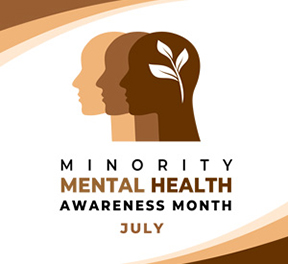
We observe National Minority Mental Health Awareness Month each July to bring awareness to the unique struggles that racial and ethnic minority communities face regarding mental illness in the United States. The U.S. Department of Health and Human Services Office of Minority Health encourages state, tribal, and local leaders, community-based organizations, faith leaders, healthcare providers and individuals to educate their communities regarding mental health stigma. According to data from the CDC, suicide was the third leading cause of death for African Americans ages 10-24 in 2020. The suicide rate is four times greater for African American men than women. African American females in grades 9-12 were 60% more likely to attempt suicide than white females.
In 2020, suicide was the second leading cause of death for Native Americans ages 10-24. The overall rate of death from suicide for Native American adults is about 20% higher than for white adults. Native Americans had the highest suicide rate of any ethnic group in 2021. In 2019, adolescent Native American females, ages 15-24, had a death rate that was five times higher than white females in the same age group. In that same period, Native American males 15-24 had a death rate by suicide that was twice that of white males in the same age group. In 2020, suicide was the second leading cause of death for Hispanics ages 10-24. Suicide attempts for Hispanic girls, grades 9-12, were 30% higher than that of white girls of the same age. From 2018-2021, suicide rates among youth aged 10-24 increased by 36% among African Americans, 16% for Native Americans, and 8.2% for Hispanics. By comparison, the suicide rate for white Americans decreased by 3.9%.
The National Alliance on Mental Illness reports that despite the need, only one in three African American adults with mental illness receive treatment. Socioeconomic factors can also play a key role. In 2020, 10.4% of African American adults had no health insurance. Among Native Americans, suicide remains highly stigmatized and may be affected by myths and misunderstandings such as: talking about suicide will make it happen, suicidal ideation is a cry for attention, and the belief that a person with a strong family would never end their life. Each of these are false. More than ½ of all Hispanic adults ages 18-25 will not receive treatment for mental illness. Reasons for this may include language barriers, less health insurance coverage, legal status, the stigma that goes with mental illness, and acculturation.
For more information about National Minority Mental Health Awareness Month, please visit National Minority Mental Health Awareness Month — Health Disparities (hhs.gov). The Jason Foundation is also a valuable resource. The Jason Foundation is dedicated to the prevention of suicide prevention through education and awareness programs. For more information on how you can help a loved one or friend struggling with mental illness or suicidal ideation, please visit www.jasonfoundation.com. All programs that The Jason Foundation offers are available at no cost.


Be the first to comment